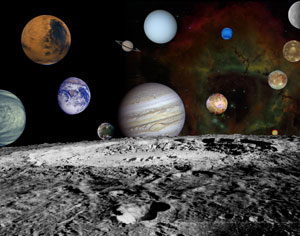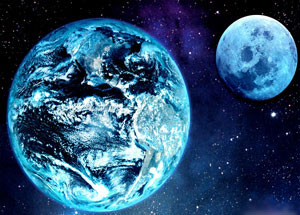 In proposing his theory, Einstein regarded the speed of light as a universal constant. No matter how fast you may go, the speed of light always remains constant. Even if you travel at a speed approaching 99% of that of light, light will still travel at 186,282 miles (299,791 kilometers) per second. It is impossible to match that speed. According to Einstein’s calculations, time decelerates as the speed of the observer increases, and space compresses according to the direction of travel. These concepts, which change according to the speed of light, prove that they are not absolute because they vary depending on the individual.
In proposing his theory, Einstein regarded the speed of light as a universal constant. No matter how fast you may go, the speed of light always remains constant. Even if you travel at a speed approaching 99% of that of light, light will still travel at 186,282 miles (299,791 kilometers) per second. It is impossible to match that speed. According to Einstein’s calculations, time decelerates as the speed of the observer increases, and space compresses according to the direction of travel. These concepts, which change according to the speed of light, prove that they are not absolute because they vary depending on the individual.
Peter Russell describes:
“. . . however fast you are moving you will always measure the speed of light to be 186.282 miles per second—just as Michelson and Morley had found. Even if you were to travel at 186,281 miles per second, light would not pass by a mere 1 mile per second faster; it would still zoom by at 186,282 miles per second. You would not have caught up with light by even the tiniest amount.
This goes totally against common sense. But in this instance it is common sense that is wrong. Our mental models of reality have been derived from a lifetime’s experience of a world where velocities are far below the speed of light. At speeds close to that of light, reality is very different.” (Russell, From Science to God, p. 61 (Emphasis in the original).)
Einstein showed that what we regard as space and time are actually part of a space-time whole. Therefore, time and space are directly created as perceptions and become part of a world that is experienced relatively. The perceptions of time and space are necessary to form an image of the world in the mind. Yet when we claim that these represent the true reality, we are mistaken, because we can never have direct experience of the true concept of space outside.
Fred Alan Wolf makes the following comment:
“According to Einstein’s theory of general relativity, matter cannot exist independent of space and time. If any one of the three—matter, space, or time—is absent, they all are. Space is necessary in order for matter to exist; matter is necessary in order for time to exist; and time is necessary in order for space to exist. They are codependent.
So, if time is just some form of a dream, an illusion, as many philosophers have speculated, then so are space and matter. Yet from the standard or Copenhagen interpretation of quantum physics, we understand that matter cannot exist without an observer of matter. (Wolf, Mind into Matter, p. 104 (Emphasis in the original).)
The fact that matter can be perceived only through our senses and in other words, is a shadow entity, again does away with the concept of space as a material concept. We perceive space as outside us, but it is totally inside the brain when we remember any place. In fact, when looking at and considering somewhere we imagine to lie outside us, the concept of space again arises solely inside the brain. The room we imagine to be standing in is an illusion forming inside our brain, a waking dream.
Peter Russell summarizes this mode of perception:
“Einstein’s work also revealed that space and time are not absolutes. They vary according to the motion of the observer. If you are moving rapidly past me, and we both measure the distance and time between two events—a car traveling from one end of a street to another, say—then you will observe the car to have traveled less distance in less time than I observe. Conversely, from your point of view, I am moving rapidly past you, and in your frame of reference, I will observe less space and time than you do. Weird? Yes. And almost impossible for us to conceive of. Yet numerous experiments have shown it to be true. It is our common-sense notions of space and time that are wrong. Once again, they are constructs in the mind, and do not perfectly model what is out there. (Peter Russell, “The Primacy of Consciousness,” http://www.peterussell.com/SP/PrimConsc.html) Einstein went even further, showing that matter was actually a form of energy. His mathematical formula for this was the famous E=mc2. An entity with mass appears solely as a form of energy.
Einstein went even further, showing that matter was actually a form of energy. His mathematical formula for this was the famous E=mc2. An entity with mass appears solely as a form of energy.
The conclusion revealed by quantum mechanics is that matter is not absolute and eternal, as materialists claim it to be. In the same way that matter is not timeless or eternal, the entities we see around us are not simply collections of atoms. According to quantum physics, matter has changed its nature in a way that materialists never dreamed of, and it has been scientifically proven that the basis of matter is simply a form of energy. In the face of the facts revealed by quantum physics, materialism has scientifically collapsed.
Paul Davies and John Gribbin summarize the way in which the new physics has entirely eliminated materialism:
“It is fitting that physics—the science that gave rise to materialism— should also signal the demise of materialism. During this century the new physics has blown apart the central tenets of materialist doctrine in a sequence of stunning developments. First came the theory of relativity, which demolished Newton’s assumptions about space and time . . . Then came the quantum theory, which totally transformed our image of matter.” (Paul Davies and John Gribbin, The Matter Myth: Dramatic Discoveries That Challenge Our Understanding of Physical Reality, Touchstone books, 1992, p. 14.)
What is the result of the collapse of materialism? The stubborn opinion that matter is the only absolute reality is one of the greatest deceptions that prevents people from believing in Allah. Instead of regarding the external world as the composite of their perceptions, they behave as if they had direct experience with everything they perceive. They apply the lack of purpose that materialism ascribes to matter to themselves, imagining that there is no reason for their existence on—or departure from—the Earth. Since they are unable to see and believe in the proofs of the existence of Allah, they expect Him to appear to them as a corporeal entity (surely Allah is beyond that). They believe that entities were never created, for which reason they never want to accept the existence of a Creator.
Using materialism as a pretext, they try to seek to deny the absolute existence of Allah and His creation. The collapse of materialism has eliminated that pretext and revealed full proof of the existence of Allah.
Particle physicist Stephen M. Barr expresses this:
“Science has taken us on just such an adventure. Armed not with weapons but with telescopes and particle accelerators, and speaking by the signs and symbols of recondite mathematics, it has brought us to many strange shores and shown us alien and fantastic landscapes. But as we scan the horizon, near the end of the voyage, we have begun to recognize first one and then another of the old familiar landmarks and outlines of our ancestral home. The search for truth always leads us, in the end, back to God.” (Stephen M. Barr, “Retelling the Story of Science,” http://www.firstthings.com/ftissues/ft0303/articles/barr.html (Emphasis added).)
Believing that there can be direct experience of matter as it exists, is itself conjecture. There is no evidence of this in this world, of which we conceive through our perceptions. We can see and touch the world only through our perceptions. It is impossible for us ever to make direct contact with the actual material world outside. The universe is not timeless and eternal, but had a beginning and will have an end. There is no “aimlessness” at any point throughout the universe, as materialists claim. The entire universe and all the entities in it have been brought into being for a purpose. All this points to a single conclusion: Creation rules at every point in the universe. The works created show the existence of a sublime power, a Creator. That Creator is Almighty Allah, Who enfolds all the worlds. In verses Allah has told us that:
In verses Allah has told us that:
“We did not create heaven and Earth and everything in between them as a game. If We had desired to have some amusement, We would have derived it from Our Presence, but We did not do that. Rather We hurl the truth against falsehood and it cuts right through its brain and it vanishes clean away! Woe without end for you for what you portray! Everyone in the heavens and the Earth belongs to Him. Those in His presence do not consider themselves too great to worship Him and do not grow tired of it.” (Surat al-Anbiya’, 16-19)
(Harun Yahya, Darwin’s Dilemma: The Soul)


